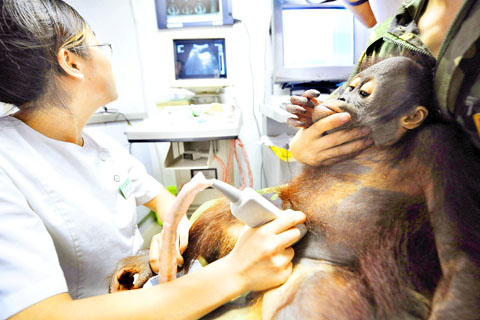Minister of Health Lin Fang-yue (林芳郁) stepped down yesterday over panic caused by the discovery of contaminated Chinese dairy ingredients and what critics said were belated and inconsistent measures to protect the public and ensure consumer confidence.
“The Department of Health’s [DOH] decision, made for efficiency’s sake, caused misunderstandings and shattered consumer confidence. I should take responsibility,” Lin said at a press conference yesterday morning after attending the weekly Cabinet meeting, during which he tendered his resignation to Premier Liu Chao-shiuan (劉兆玄).
Lin’s resignation was approved later yesterday, making him the first official in President Ma Ying-jeou’s (馬英九) administration to step down. The DOH was first blamed for its slow reaction to and mismanagement of the crisis involving Chinese dairy products tainted with the chemical melamine, and then for its inconsistent decisions.

PHOTO: AP
Deputy ministers of health Sung Yen-jen (宋晏仁) and Cheng Shou-hsia (鄭守夏) tendered resignation letters together with Lin.
Liu also approved the resignation of Bureau of Food Safety (BFS) Director Hsiao Tung-ming (蕭東銘).
Late last night, Presidential Office Deputy Secretary-General Yeh Ching-chuan (葉金川), a public health expert, was named as the next health minister.
Critics said the department should have banned dairy imports from China, checked with importers to see if imported products were tainted, and ordered an inspection or sampling of Chinese imports that had reached Taiwan.
Lin’s resignation comes as many consumers and businessmen express frustration over the DOH’s “loose” food inspection standards.
Late on Wednesday night, Sung told a press conference that the DOH had decided to loosen the food safety standard for melamine from 0 parts per million (ppm) to 2.5ppm, meaning that products containing up to 2.5ppm of the chemical could still enter the Taiwanese market.
Based on the new standard, the products of two food companies, which tested positive for melamine under the stricter standard, were allowed to go back on sale, sparking consumer anger.
The DOH said the revised standard was applied after taking into consideration instrument sensitivity and standards in other countries.
Executive Yuan Spokeswoman Vanessa Shih (史亞平) told a press conference yesterday that Liu met with Lin in the afternoon and expressed the hope that Lin would remain in his post.
“But Minister Lin insisted on resigning,” Shih said.
Liu praised Lin for his handling of the controversy, saying the DOH had taken accurate and forthright action from the beginning of the incident to impose bans on imports, to locate the whereabouts of tainted raw materials and to require questionable foodstuffs to be pulled from shelves, Shih said.
Liu had also expressed his admiration over Lin taking political responsibility for the late change in testing standards for the concentration of melamine that caused the unrest, and thanked him for his contributions over the past four months, Shih said.
Later yesterday afternoon, Lin was questioned by Control Yuan member Cheng Jen-hung (程仁宏), who has launched a probe to determine if there were any irregularities or instances of negligence in the government’s handling of the case.

CHAOS: Iranians took to the streets playing celebratory music after reports of Khamenei’s death on Saturday, while mourners also gathered in Tehran yesterday Iranian Supreme Leader Ayatollah Ali Khamenei was killed in a major attack on Iran launched by Israel and the US, throwing the future of the Islamic republic into doubt and raising the risk of regional instability. Iranian state television and the state-run IRNA news agency announced the 86-year-old’s death early yesterday. US President Donald Trump said it gave Iranians their “greatest chance” to “take back” their country. The announcements came after a joint US and Israeli aerial bombardment that targeted Iranian military and governmental sites. Trump said the “heavy and pinpoint bombing” would continue through the week or as long

TRUST: The KMT said it respected the US’ timing and considerations, and hoped it would continue to honor its commitments to helping Taiwan bolster its defenses and deterrence US President Donald Trump is delaying a multibillion-dollar arms sale to Taiwan to ensure his visit to Beijing is successful, a New York Times report said. The weapons sales package has stalled in the US Department of State, the report said, citing US officials it did not identify. The White House has told agencies not to push forward ahead of Trump’s meeting with Chinese President Xi Jinping (習近平), it said. The two last month held a phone call to discuss trade and geopolitical flashpoints ahead of the summit. Xi raised the Taiwan issue and urged the US to handle arms sales to

State-run CPC Corp, Taiwan (CPC, 台灣中油) yesterday said that it had confirmed on Saturday night with its liquefied natural gas (LNG) and crude oil suppliers that shipments are proceeding as scheduled and that domestic supplies remain unaffected. The CPC yesterday announced the gasoline and diesel prices will rise by NT$0.2 and NT$0.4 per liter, respectively, starting Monday, citing Middle East tensions and blizzards in the eastern United States. CPC also iterated it has been reducing the proportion of crude oil imports from the Middle East and diversifying its supply sources in the past few years in response to geopolitical risks, expanding

Pro-democracy media tycoon Jimmy Lai’s (黎智英) fraud conviction and prison sentence were yesterday overturned by a Hong Kong court, in a surprise legal decision that comes soon after Lai was jailed for 20 years on a separate national security charge. Judges Jeremy Poon (潘兆初), Anthea Pang (彭寶琴) and Derek Pang (彭偉昌) said in the judgement that they allowed the appeal from Lai, and another defendant in the case, to proceed, as a lower court judge had “erred.” “The Court of Appeal gave them leave to appeal against their conviction, allowed their appeals, quashed the convictions and set aside the sentences,” the judges